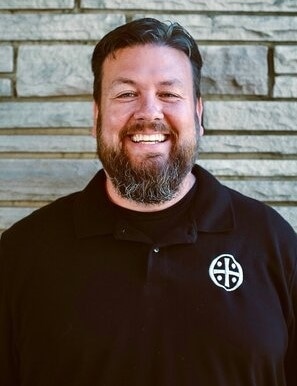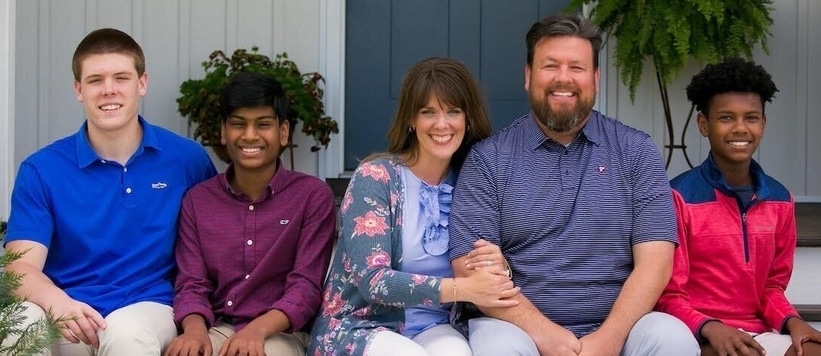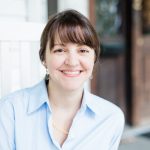ADOTS would like to offer its congratulations to Fr. Jake Stum, who has been named the new Executive Director for the Anglican Relief and Development Fund! The organization’s previous Director, Canon Bill Deiss, retired at the end of June.

Fr. Jake Stum
Fr. Jake is transitioning from leadership at Mission Cleveland, TN to his new role in ARDF, the relief and community development arm of the Anglican Church in North America — serving communities in need both internationally and domestically. Read ARDF’s blog post about Fr. Jake and his experience in community development work.
Canon Chris Sorensen has served as Fr. Jake’s abbot while his team planted Mission Cleveland as part of The Mission Chattanooga group of churches. “Fr. Jake is an amazing man of faith and vision. He is humble, smart, and resourceful,” says Canon Chris. “We are so proud of him taking on this new role with ARDF, and we are thrilled about what he will bring to that organization.”
For more about his heart for global relief and development, ADOTS Communications Associate Rachel Moorman interviewed Fr. Jake about the future of ARDF, its sustainable model, and the past work that has shaped his ministry.
It was just a few years ago that I interviewed you about The Mission Cleveland church plant, and you were pursuing ordination in the ACNA. Time flies! What is happening at Mission Cleveland today?
Launching Mission Cleveland has been such an amazing journey. God has been very gracious to us. We started with about 30 people who were mostly Cleveland residents that were driving over 30 minutes to attend The Mission Chattanooga. In 2017, we gathered monthly as a core team to pray and establish our vision/DNA for Cleveland. We also had quarterly worship services during that year. This allowed us to grow to around 50 people before we launched weekly services in December of 2017. Since then, we have continued to grow into a healthy self-sustaining church. We have a wonderful pastoral team including Fr. Dale Hall, Fr. Luke Campbell, Deacon Luke Mathews, Aspirant Payton Cody, and wonderful children’s and worship pastors. We also have our Abbot — Chris Sorensen — who is a great leader and guide to our team. As I have transitioned to ARDF, the team has continued to thrive.
You have a PhD in Organizational Leadership and have worked with domestic and international non-profits for years: I’d love to hear your favorite stories of hope from your previous community and resource development work.
One of my favorite projects was the development of a training farm in Takam, Cambodia. This rural village was suffering from extreme poverty and all of the problems that come along with that reality. Residents of the village developed a plan to begin a training farm that would experiment with new crops, new irrigation methods, and other creative farming solutions. They wanted to do this to both physically help the village, but also to be a way to open the door for spiritual development and Christian discipleship. We were able to help raise resources for this group of Cambodian farmers, and they have thrived in an unbelievable way. They are training farmers, employing widows, providing healthy food, and educating children. This has allowed them to plant a very successful church and also launch a school. The Kingdom of God has been revealed in Takam. When community development is done in a healthy way and connected to the church, it is a powerful tool for Kingdom expansion.
I have also had the joy of working with a local project in Cleveland, TN created to bring about revitalization in one of the most overlooked census tracts in the state of TN. We holistically worked to bring about flourishing in the neighborhood. We focused on physical revitalization, economic development, social revitalization, neighborhood safety, and leadership development. Through partnership with the residents, the area is being transformed.
The ARDF model is one of sustainability through local church partnerships, and we’re seeing just how necessary that is during times of crisis such as COVID-19. Please talk about the effectiveness of this model and how ARDF can continue to build on it.
My passion for the local church to engage in healthy relief and development projects grew over time. I began to realize, after having the chance to travel globally, that the church often did not have a good strategy. We could unintentionally end up doing harm out of sincere hearts to make an impact. We could tend to create dependency, try to take over projects from local leaders, and be haphazard in the way we distributed our resources and mission teams. This passion grew in me to educate myself around the best practices of development and relief.
This is why I have fallen in love with the vision of ARDF to be the Anglican Church in action. Our model attempts to follow the best practices of healthy relief and development work. We work closely in partnership with local church leadership. We partner with them to help their dreams for their community become a reality. We are now hearing of the tragic results of the pandemic in many international contexts. Many of those countries don’t have the infrastructure to assist their constituents or provide safeguards against corruption. This results in extreme unemployment, price gauging, unemployment, and devastation. It is heartbreaking to read all of the applications that we receive for funding. The good thing, however, is that we have trusted partners on the ground in these areas. We have Anglican leadership that knows how to help and implement development strategy. We have a system in place to get them resources quickly so that they can do the Gospel work of caring for those who are hurting. I am thanking the Lord for our model in this pandemic. We can move quickly with trusted people to bring real hope.
What are you excited about for the future of ARDF?
I am so excited to grow the awareness of ARDF among Anglicans in America and with our partners around the globe. The way that we go about selecting, vetting, and developing projects is something for the entire Anglican communion to be very proud of. We have a strong foundation, proven strategy, trusted partners, and the benefit of a history of great leadership. Canon Bill Deiss paved the way for future growth. Each year we receive a significant amount more in requests for funds than we have to give away. I am excited to see that gap shrink in the future so that we can keep empowering our partners to be the hands and feet of Jesus around the world.
Lastly — I’m fascinated by the varied interests and talents people have, and it’s so fun that you and your wife, Merica, once owned and operated a screen-printing apparel design business! How did you get involved in that work, and do you think it’s shaped your ministry in any way?
Great question! We actually had a friend who owned the company. He helped us become the owners and gave us an opportunity to grow in our business knowledge which was significantly lacking. We wanted to have the experiences of operating a business and allow it to provide income to help us in our mission work. At the time, I worked for an international non-profit and had to raise our budget, so this helped offset those costs. To be honest, it was more difficult than we ever dreamed. We made all kinds of mistakes. It, however, shaped us as much as anything we have ever done. We learned how to relate to business owners, how to understand commercial finances, and how to have deep compassion for anyone trying to grow a small business. It gave us a new level of credibility in the business world. I can say, however, that my wife and I both learned that we MUCH prefer working in the non-profit world!

Merica and Fr. Jake Stum with their children.

by Rachel Moorman
Communications Associate
news@adots.org
